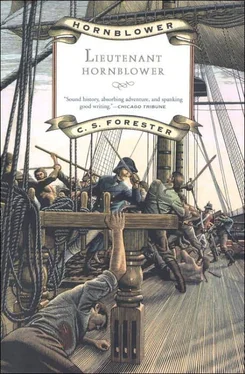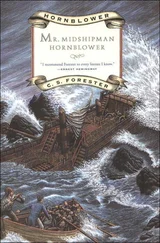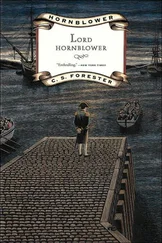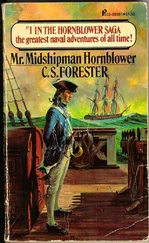The others agreed to that with a fierce roar, like wild beasts.
“Gentlemen,” said one of the players at Hornblower’s table, looking round over his shoulder. “Could you find it convenient to continue your discussion at the far end of the room? This end is dedicated to the most scientific and difficult of all games.”
The words were uttered in a pleasant high tenor, but it was obvious that the speaker had every expectation of being instantly obeyed.
“Very good, my lord,” said one of the naval officers.
That made Bush look more closely, and he recognised the speaker, although it was six years since he had seen him last. It was Admiral Lord Parry, who had been made a lord after Camperdown; now he was one of the commissioners of the navy, one of the people who could make or break a naval officer. The mop of snowwhite curls that ringed the bald spot on the top of his head, his smooth old-man’s face, his mild speech, accorded ill with the nickname of ‘Old Bloodybones’ which had been given him by the lower deck far back in the American War. Hornblower was moving in very high society. Bush watched Lord Parry extend a skinny white hand and cut the cards to Hornblower. It was obvious from his colouring that Parry, like Hornblower, had not been to sea for a long time. Hornblower dealt and the game proceeded in its paralysing stillness; the cards made hardly a sound as they fell on the green cloth, and each trick was picked up and laid down almost silently, with only the slightest click. The line of tricks in front of Parry grew like a snake, silent as a snake gliding over a rock, like a snake it closed on itself and then lengthened again, and then the hand was finished and the cards swept together.
“Small slam,” said Parry as the players attended to their markers, and that was all that was said. The two tiny words sounded as clearly and as briefly in the silence as two bells in the middle watch. Hornblower cut the cards and the next deal began in the same mystic silence. Bush could not see the fascination of it. He would prefer a game in which he could roar at his losses and exult over his winnings; and preferably one in which the turn of a single card, and not of the whole fiftytwo, would decide who had won and who had lost. No, he was wrong. There was undoubtedly a fascination about it, a poisonous fascination. Opium? No. This silent game was like the quiet interplay of duelling swords as compared with the crash of cutlass blades, and it was as deadly. A smallsword through the lungs killed as effectively as—more effectively than—the sweep of a cutlass.
“A short rubber,” commented Parry; the silence was over, and the cards lay in disorder on the table.
“Yes, my lord,” said Hornblower.
Bush, taking note of everything with the keen observation of anxiety, saw Hornblower put his hand to his breast pocket—the pocket that he had indicated as holding his reserve—and take out a little fold of onepound notes. When he had made his payment Bush could see that what he returned to his pocket was only a single note.
“You encountered the worst of good fortune,” said Parry, pocketing his winnings. “On the two occasions when you dealt, the trump that you turned up proved to be the only one that you held. I cannot remember another occasion when the dealer has held a singleton trump twice running.”
“In a long enough period of play, my lord,” said Hornblower, “every possible combination of cards can be expected.”
He spoke with a polite indifference that for a moment almost gave Bush heart to believe his losses were not serious, until he remembered the single note that had been put back into Hornblower’s breast pocket.
“But it is rare to see such a run of ill luck,” said Parry. “And yet you play an excellent game, Mr—Mr—please forgive me, but your name escaped me at the moment of introduction.”
“Hornblower,” said Hornblower.
“Ah, yes, of course. For some reason the name is familiar to me.”
Bush glanced quickly at Hornblower. There never was such a perfect moment for reminding a Lord Commissioner about the fact that his promotion to commander had not been confirmed.
“When I was a midshipman, my lord,” said Hornblower, “I was seasick while at anchor in Spithead on board the Justinian . I believe the story is told.”
“That doesn’t seem to be the connection I remember,” answered Parry. “But we have been diverted from what I was going to say. I was about to express regret that I cannot give you your immediate revenge, although I should be most glad to have the opportunity of studying your play of the cards again.”
“You are very kind, my lord,” said Hornblower, and Bush writhed—he had been writhing ever since Hornblower had given the goby to that golden opportunity. This last speech had a flavour of amused bitterness that Bush feared would be evident to the admiral. But fortunately Parry did not know Hornblower as well as Bush did.
“Most unfortunately,” said Parry, “I am due to dine with Admiral Lambert.”
This time the coincidence startled Hornblower into being human.
“Admiral Lambert, my lord?”
“Yes. You know him?”
“I had the honour of serving under him on the Jamaica station. This is Mr. Bush, who commanded the storming party from the Renown that compelled the capitulation of Santo Domingo.”
“Glad to see you, Mr. Bush,” said Parry, and it was only just evident that if he was glad he was not overjoyed. A commissioner might well find embarrassment at an encounter with an unemployed lieutenant with a distinguished record. Parry lost no time in turning back to Hornblower.
“It was in my mind,” he said, “to try to persuade Admiral Lambert to return here with me after dinner so that I could offer you your revenge. Would we find you here if we did?”
“I am most honoured, my lord,” said Hornblower with a bow, but Bush noted the uncontrollable flutter of his fingers towards his almost empty breast pocket.
“Then would you be kind enough to accept a semiengagement? On account of Admiral Lambert I can make no promise, except that I will do my best to persuade him.”
“I’m dining with Mr. Bush, my lord. But I would be the last to stand in the way.”
“Then we may take it as being settled as near as may be?”
“Yes, my lord.”
Parry withdrew then, ushered out by his flag lieutenant who had been one of the whist four, with all the dignity and pomp that might be expected of a peer, an admiral, and a commissioner, and he left Hornblower grinning at Bush.
“D’you think it’s time for us to dine too?” he asked.
“I think so,” said Bush.
The eating house in Broad Street was run, as might almost have been expected, by a woodenlegged sailor. He had a pert son to assist him, who stood by when they sat at a scrubbed oaken table on oak benches, their feet in the sawdust, and ordered their dinner.
“Ale?” asked the boy.
“No. No ale,” said Hornblower.
The pert boy’s manner gave some indication of what he thought about gentlemen of the navy who ate the fourpenny ordinary and drank nothing with it. He dumped the loaded plates in front of them: boiled mutton—not very much mutton—potatoes and carrots and parsnips and barley and a dab of pease pudding, all swimming in pale gravy.
“It keeps away hunger,” said Hornblower.
It might indeed do that, but apparently Hornblower had not kept hunger away lately. He began to eat his food with elaborate unconcern, but with each mouthful his appetite increased and his restraint decreased. In an extraordinarily short time his plate was empty; he mopped it clean with his bread and ate the bread. Bush was not a slow eater, but he was taken a little aback when he looked up and saw that Hornblower had finished every mouthful while his own plate was still half full. Hornblower laughed nervously.
Читать дальше









